The ban on same-sex marriage in Michigan can tear families apart
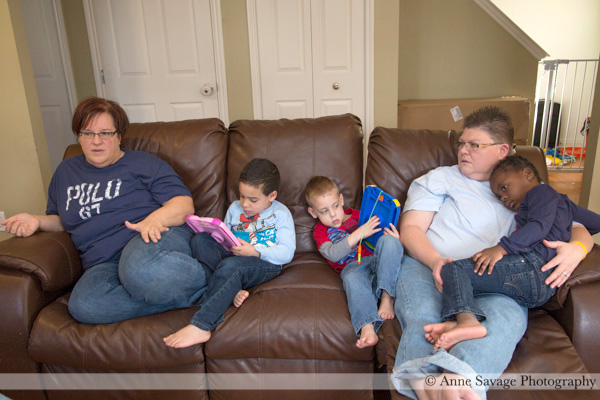
[left to right: April, Nolan, Jacob, Jayne, and Ryanne]
A few years ago, what started as a family vacation in Ohio nearly ended up in a fatal car crash for April DeBoer and Jayne Rowse. The two nurses had their three adopted children with them and the close call made them realize that they needed to have a plan in place in case something happened to one or both of them. That’s when they learned that, no matter how carefully and thoroughly they planned, a judge could throw it out the window and send their kids to live with relatives they may not even know. Why? Because, as lesbians, Jayne and April aren’t seen as “married” and Michigan adoption law prevents unmarried couples from adopting. In fact, Michigan Attorney General Bill Schuette has gone so far as to say these two women and their three beautiful children aren’t even an actual family.
The very suggestion that they are not a family is an insult beyond measure.
Once they decided to challenge Michigan’s adoption laws that prevent unmarried couples from adopting so that each has equal rights regarding the children, the case came before a federal judge in Detroit, Justice Bernard Friedman. Judge Friedman encouraged them to go further and challenge Michigan’s same-sex marriage ban, the root cause of why Jayne and April are unable to jointly adopt children. After hearing arguments, Judge Friedman agreed over the summer to let the case go forward and set a hearing date for October 16th. While gay couples around the state prepared for the possibility that the Michigan’s bigoted law would be struck down, Judge Friedman instead decided not to rule that day. Instead, he decided to try the case in his court and the trial begins in February of 2014.
Throughout this process, Attorney General Schuette, on behalf of the state, has made some outrageous claims in the paperwork he has filed. In addition to claiming that what April and Jayne have is not a family, he made another particularly absurd statement that marriage “is, and always has been, to regulate sexual relationships between men and women so that the unique procreative capacity of such relationships benefits rather than harms society.” This was shocking news to infertile couples, elderly couples, and other Michigan couples who can not or have chosen not to have children.
April and Jayne are both nurses and live in Hazel Park, Michigan. Anne and I visited them at their home this past weekend where we got to know them and their three adorable kids, Nolan, Ryanne, and Jacob.
After reading the interview, I encourage you to click HERE and contribute to their legal defense fund. The team of lawyers that has taken on this case hasn’t been paid a thing during the entire process. Not only that, they have several expert witnesses who will testify in court in the case the begins February 25th and they must be paid. While challenges to marriage equality laws in other states have raised millions of dollars, this one appears to be flying under the radar. Because this case is likely to end up in the U.S. Supreme Court, it is essential that the legal groundwork is laid properly during this trial as it will be relied upon by the Supreme Court justices later. Please give generously and spread the word to others.
All photos by Anne C. Savage.
I think one of the important things that people need to realize is that what you have here is a family, just like everyone else. What makes you remarkable, in my mind, is that you’re adopting kids and fostering kids and most other people don’t do that, and not that the two of you happen to be women. What’s amazing about you is that you open your home and your hearts to all of these children.
APRIL: It’s funny because, as much as you say that it’s not common, for pretty much all of our friends, that’s how their families are coming about, from adopting. We have friends who are in the process of adopting three kids. We have another set of friends who adopted two boys. We have a set of friends who have adopted four, two boys and two girls. A male couple friends of ours are just getting into fostering children. And it’s amazing how many people, when you tell them you have foster kids or have adopted kids outright, how many people have stories of family members who have fostered or adopted.
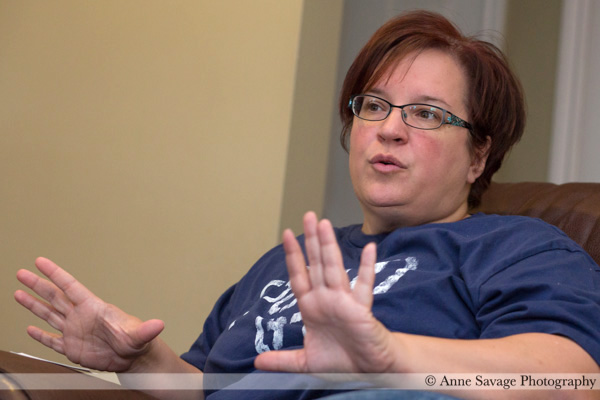
JAYNE: Like that lady we met the other night.
APRIL: Yeah! They have five kids of their own, they’ve started fostering, and they’ve adopted five kids from the foster care system, and in I don’t know how many years, they’ve had 230 foster placements in the years that they’ve done it. In fact, the wedding that we attended, they were at the wedding because one of the people that was getting married was one of their foster kids who somebody else had adopted.
She came up to us because she recognized us and was asking us, “Do you know this person? Do you know that person?” I knew she was the type of person who wasn’t going to be happy until she figured out how she knew us so I said, “Well, we’ve been on tv. We’re the couple that’s fighting for adoption rights” and she said, “YES! That’s it! I didn’t recognize you without all the kids!” I can’t tell you how many people don’t know who we are until the three kids come traipsing by.”
JAYNE: We were at the new Meijers at Eight Mile and this lady came by and started yelling, “Oh my goodness! You’re the people from tv! Agnes! It’s the people from tv!” and started giving us thumbs up.
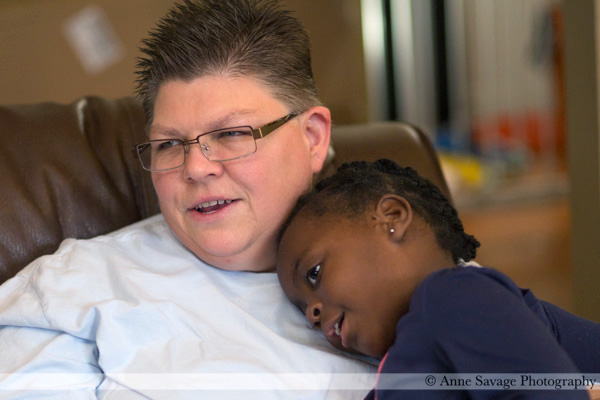
APRIL: We laugh and it’s sort of a joke we share but the people who recognize us are not the people you would expect. They’re usually the 50, 60, 70, 80-year old little old women who chase us through Kroger saying, “I know who you are!” Most of the time when you consider that generation you’re thinking they’d be more homophobic. But then we get, “We’re rootin’ for ya! You go!”
Really? So you’re getting support from your community then?
JAYNE: Definitely. We were at a Tigers game and this couple were screaming, going, “Woo! Woo!” and we had no idea who they were. Then they started waving and yelling, “HI! We’re behind you!” I mean how do you pick us out of a sold-out Tigers game?!
So, who is the first of the bunch here?
APRIL: Nolan.
Nolan was first? And how long ago was that?
APRIL: Nolan’s the oldest, he’ll be five in January, and we were at his birth. Actually, all of them we brought home from the hospital.
So, these were kids you knew were not going to have a family, that they’d be up for adoption?
APRIL: Nolan was a private placement adoption so there was no fostering involved. One of my coworkers knew of a mom who couldn’t keep her baby so we met and we talked and three weeks later we brought home a bouncing baby boy!
And who was second?
APRIL: Who was second to come home or who was second to be born?
Ah! Good question!
APRIL: Second to come home would be Ryanne. Ryanne came home a year and seven days after Nolan did. She was also a private placement adoption. She was a baby that was going to be safe havened at the hospital but one of our doctors happened to mention to the mom that they knew someone who was looking to adopt a baby girl. The joke that’s told in our family is that I went to work one day and came home with a baby. And, literally, I did!
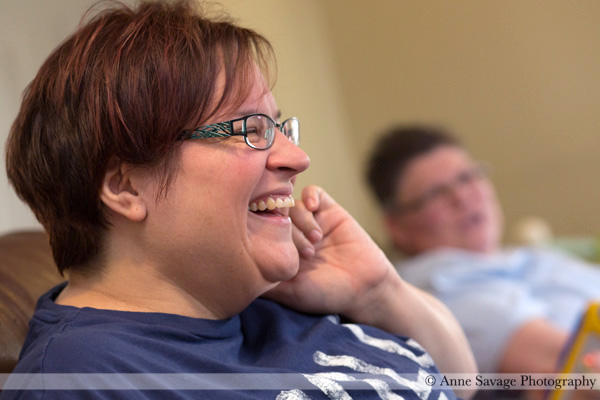
So, Jacob’s older than her but came home after Ryanne?
APRIL: Jacob is three months older than Ryanne but he was born at 25 weeks. He was one pound, nine ounces when he was born. He was actually one of my patients. I was his primary nurse for quite awhile.
Sounds like an occupational hazard for you!
APRIL: It’s very funny because he’s the only patient that I’ve had that kind of a bond with where it was noticeably different than with my other patients. Everyone on the floor adored him but we had a really special bond.
But, here’s the interesting part of this story: he was randomly placed in our home. We had made some phone calls…
Wait. He was your patient but he was randomly placed with you? So the odds of him ending up with you were hugely stacked against you. It’s like it was meant to be, right?
At one point during the course of his care, the other nurses and I started discussing the fact that he wasn’t going to live. He was in liver failure, his spleen was three times its normal size, and he was actually three to four times the size he was supposed to be at that time. His skin was stretched so far that if he had gained any more weight it would have started tearing his skin. We had started to discuss the fact that we were going to do some kind of memorial for Jacob because we weren’t just going to let him go and not remember him. And, like I said, it wasn’t just me. It was everyone on the unit.
At one point, I told Jacob, “You try to live and I’ll try to find you a good foster home.” But I also told him that, if it got to be too much, he just needed to let go. About two and half weeks later he turned around.
I had given up adopting him at that point. We had contacted the foster agency but because of HIPAA [Health Insurance Portability and Accountability Act of 1996], I couldn’t give them any information. So we were asking roundabout questions like, “How often do you place from Wayne County?” and asking if there was anything we could do to have this child placed in our home and they were like, “There is nothing you can do. It’s random and there’s absolutely nothing you can do.”
JAYNE: Detroit has a lottery system. It’s literally Bingo. They pull your name randomly. It’s like “B9”. [laughs]
APRIL: Our agency is out of Oakland County and they said that they place out of Wayne County maybe, maybe once a year.
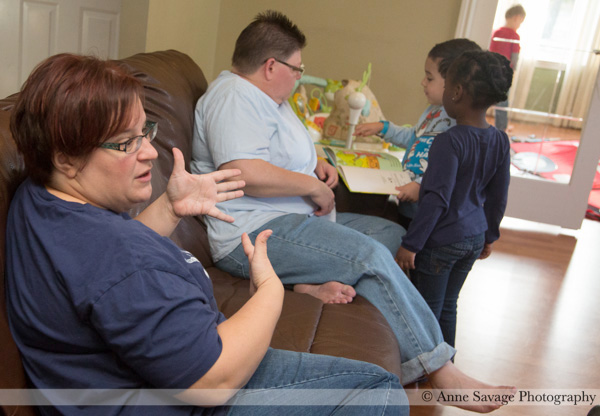
So, we gave up on being able to adopt Jacob. Ryanne came; we took Ryanne in and, three weeks to the day that we brought Ryanne home, we got a phone call from our agency. Jayne answered phone and she’s like, “Uh huh, uh huh. Oh, a baby.” I’m like, “Hang up that phone! We have a one-year old and a three year old. Hang. Up. The. Phone!”
And she kept saying to the person on the phone, “Yeah? Okay. Alright…”
And I’m saying, “If you don’t hang up that phone, I’M going to hang up that phone!”
Ryanne is screaming in my arms. Nolan is trying to walk. And, I’m like, there is no way on God’s green earth that we need another child. No.
So, she’s listening and listening and listening then she asked the person, “Are you sure that’s where he is?” and I’m thinking, “What in the world is she talking about?”
Then she says, “Wait a minute” then turns to me and says, “It’s your baby. They are calling about your baby.”
The only difference was that they hospital that they said he was at was not actually the hospital where he was. But, it’s part of the hospital system that I work for. But, other than that, there’s no way there are two baby boys that have the same things going on.
About three hours later we got confirmation that it was actually him.
So, you changed your mind.
APRIL: Well, we had said along that, with a boy and a girl, that we were pretty much done. We’d foster maybe down the line, maybe, but that was it. But there was always the stipulation that it was unless this little boy came up and then we would take him in.
How is his health now?
We’ve had a lot of work. He’s had a lot of occupational therapy, a lot of physical therapy. He’s still doing those and he’s in speech therapy. Physically you wouldn’t know the difference. Most people who come into our home and sit down and talk to him and interact with him don’t notice. But he’s got some developmental delays, dealing with his own emotions, for example. He sometimes doesn’t know how to express his feelings, for example.
But he’s amazing. He started walking when he was two-years old.
JAYNE: It was right around Christmas he started to walk and talk.
APRIL: Jayne had a shirt on that said “Oakland Community College”. He had just started talking where he was saying actual words and one day he walked by her and said, “O-A-K-L-A-N-D” and we were like, “Wait a minute! Back up! What was that?!”
And then he went, “C-O-L-L-E-G-E”.
He was just two?
JAYNE: Yes. You know, they watch Dora the Explorer and Super Why! which does a lot of letters, but you never knew what was going on in his head. He would sit and he would watch and then he would go away and come back. But we never knew. He would just sit and, even though he couldn’t verbalize it, he was absorbing it.
APRIL: A year later, after he had been going to Early On and then Head Start, he came home one day and he had this doodle pad. He came up to me and he showed me his doodle pad and said “J!” and there was this perfect “J” on the screen. So I erased it and said, “Okay, do it again.” So he drew another “J”. So, I erased it and said, “Do your name.” He drew “J-A-C-O-B” and said, “Jacob!” and walked away.
So, I called his teacher and said, “Did you know he could spell and write?” She said, “No!” and I said, “The boy can write his name!”
He was just waiting for his body to catch up with his brain, it sounds like.
APRIL: Yeah, exactly. But, you know, there are still things that we have to work with and things that we have to deal with.
When he was sent home, I had a pretty good idea of what his condition was, but nobody bothered to tell me as the NICU [neonatal intensive care] nurse that he was being sent home to die, that they had given up and there was nothing more that they could do. About three months after I took him home we were at a doctor’s appointment and I passed the doctor that discharged him and I asked her, “Do you remember Jacob?”.
And she said, “Yeah, I do. When did he die?”
I said, “This is him.”
She looked down and said, “You have got to be kidding.”
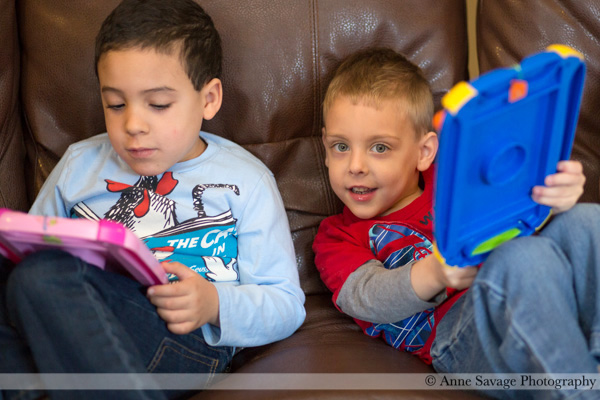
Nolan (l) and Jacob (r)
We had been told that, if he did survive, he would need a liver transplant and, if he did survive, he would never walk or talk or feed himself or do anything a normal child can do. Today, thanks to a great GI doctor, his liver healed itself so he didn’t need the liver transplant. And, obviously, he walks, talks, and feeds himself!
So the law in Michigan is that single people can adopt but gay couples can’t. Is that right?
APRIL: Single people. Married couples can adopt. But unmarried couples cannot adopt. So, the example that we like to use is that, if Brad Pitt and Angelina Jolie showed up here in Michigan, they could not adopt a child together.
So the two of you have to adopt these kids as individuals.
APRIL: Correct.
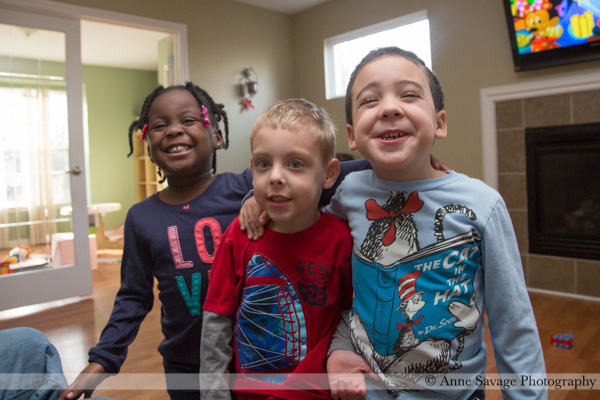
So, is that what you’ve done? One of you adopted a couple of them and the other adopted the other one?
APRIL: We had the unusual pleasure of working with an agency that allowed us to do staggered adoptions. We’ve learned since that most agencies don’t allow that.
So, they make one person do all of the adoptions?
APRIL: Yeah. Most agencies will not allow you to stagger your adoptions like we did.
Is the rationale that they want to keep all of the kids together if something happens?
APRIL: Yeah.
So, it was March of 2013 that the two of you decided to challenge that adoption law. Is that something that you decided to do yourselves or did you have people encouraging you or something else?
APRIL: The actual events that led to this is that we had taken the kids and gone down to Ohio for a vacation and we were coming back from Ohio on a two-lane highway. A truck was passing in our lane and it was snowing. The truck was in our lane coming right at us and we had nowhere to go. It was barreling down the road right towards us and the thing that saved us was that the guy in the truck made the decision to drive off the road into a field. Had he not done that, Jayne and I for sure would not have survived. I can guarantee that. As fast as he was going and as much weight as he was carrying because he was towing a washer or dryer or something in the back, there would have been no way that she and I would have survived.
That shook us up enough to say, hey, we need to make plans. What if one of us didn’t survive and one of us passes away? Only one of us has legal rights to these kids and we need set up our will and our trust and all of that to make sure that this is going to happen. All along, that’s what we thought would protect us. Everybody talked about doing wills and trusts and getting everything down on paper.
When was this?
JAYNE: That was around winter of 2011/2012.
So, we happened to learn about Dana Nessel from a board that we were on. She was working on the Renee Harmon case.
Which was…?
APRIL: It was a case involving two women who had lived together for something like 20 years. Her partner had given birth to three children and they had split up and she was trying to get visitation rights to see the children they had raised together and the Supreme Court turned her down.
So, we contacted Dana Nessel and we told her our story and she said, “You can write all of this. You can write it all on a piece of paper. You can cross every ’t’ and dot every ‘i’ but, if something happens to one of you, a judge can make whatever decision he or she likes.” If they believe that my straight mom would be a better parent to my daughter than her actual mother who has been raising her, then they can split the family. Keep in mind that you’re not just splitting a child from her parent but you’re also splitting siblings, splitting entire families.
What I like to point out to people is that my dad’s fourth cousin has more legal rights to Ryanne than Jayne does. Somebody that I don’t even know has more rights than Jayne does.
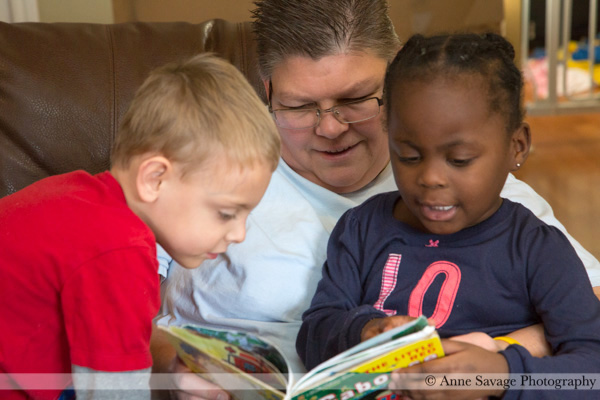
So, how did the lawsuit come about? I’m curious. Did you just one day have enough and say, “I’m done with this and I’m going to do something about it!” or were you approached by someone or a group that said, “Look, we’re looking to push this issue and we need someone to put their name on the lawsuit”?
APRIL: Well, we were talking to Dana and she said, “Look, this is the way it is and, until someone comes along and changes this, these are your options. You can write down your wishes and pray or you can move to another state or somebody can fight this.”
Jayne and I did a lot of talking and mulling it over until one day Dana called us and asked us what we wanted to do. And I told her that, you know, we’re just two nurses struggling to get by. We want to fight it but we don’t have the means to fight this. I mean, you’re talking court case upon court case. So, we started talking and she started talking then she said, “We’ll do it. We’ll fight this.”
She hasn’t made anything on this, right?
APRIL: No. They haven’t. I mean, we do what we can but, again, we’re a family of five trying to make it through and trying to make a living. We’re both in school, we’re both completing our bachelors degrees so we’re taking on more debt to get our education so that we can better ourselves.
So were you surprised when Judge Friedman suggested that your case go farther than just the adoption rules and challenge the same-sex marriage law itself?
JAYNE: Absolutely. Of all the scenarios that we could have conjured up in our minds, I don’t think any of us even thought of that one.
APRIL: You could have, when he suggested it, you could hear all of the attorneys at our table gasp out loud. Jayne and I looked at each other and said, “He did NOT just say that, did he?”
JAYNE: We were like, “Whoa, that’s NOT where we thought that would go.”
APRIL: We thought he’d say “Yes” or “No” and that would be it. So, never in a million years… Remember that the initial challenge was just to the adoption laws. We had to think about it. We had to think about challenging the marriage ban. Because, when you’re talking about adoption, you’re talking about the children. People are going to think, “Okay, this is about the children and the rights to the children.” When you start getting into marriage, that’s our personal relationship, even though it gives us legal rights involving the kids.
It’s interesting when you look at it from that perspective. If you just go for second parent adoption rights, that can affect all couples. So, you could have an unmarried man and woman who want to adopt together. If you look at it from the approach that Judge Friedman moved you into, those people no longer benefit from what you’re doing because it’s about same sex couples getting married.
APRIL: Right.
Were the two of you expecting there to be this much publicity?
JAYNE: Well, I think it really blew up when it became gay marriage. When it was just about gay couples adopting people were, like, “Ehh…” But, when it became about gays getting married, people really got interested.
APRIL: There were definitely stories when it was about adoption and second parent adoption, but it really took a turn when they brought in the marriage aspect.
I assume your case is getting national attention, too, in terms of people coming to your home to talk to you?
APRIL: Not really. Most of the people who have come to our home have been local. We did do a story with Real Simple magazine for a series they call “Real Families”.
JAYNE: Hardball with Chris Matthews covered our story, too, but we didn’t actually appear on the show.
What sort of response have you gotten from people about what you’re trying to do?
APRIL: What I find most often is that people just don’t know.
Don’t know about the issue or…?
APRIL: If you don’t know somebody is gay or if you don’t have some sort of connection to gay people in your family or wherever, people have no idea. Like, when we adopted our kids, people just assumed that we adopted together. They had no idea that we didn’t have rights to do that.
JAYNE: When I started talking about this at work, all of the nurses I work with — who I consider to be rather smart! — were like, “What? You can’t adopt them together?” I told them, no, we have to adopt them separately and, if something happens to one of us, the other one doesn’t automatically have rights to the kids. And they were like, “Oh my God, that’s just crazy.” Even the doctors I work with said that. They had no idea.
Is there anything that you’d like for people to know that we haven’t talked about?
APRIL: I just want people to know, especially with this being National Adoption Month — we’ve had people say that we don’t cherish the birth mothers of our children and that’s just not true. I just want to say that, without them, we wouldn’t have kids and they are a very big and important part of our kids’ lives. Whatever part of their personal story was told was told not to hurt them or diminish them but to explain how we got to where we are right now. We cherish the gift that these people have given us and we are standing up and doing what we told them we would do which is protect their kids. That’s very important to us.
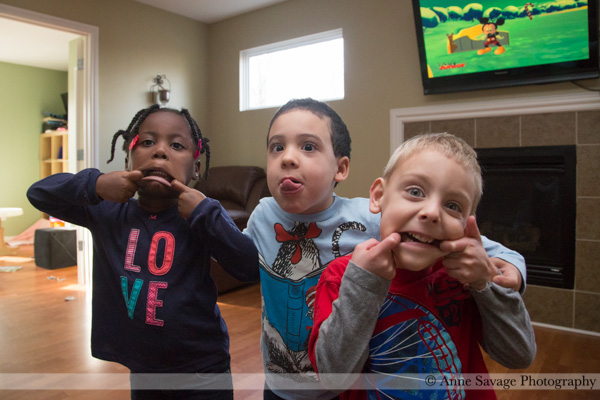
Please donate to the legal fund for April and Jayne’s fight to overturn Michigan’s discriminatory ban on same-sex marriage by clicking HERE.



